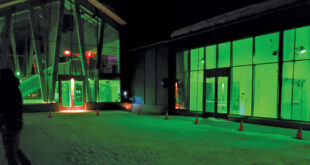Concern for other tax measures
With concerns about the success of some other local tax measures going to voters on the ballot this November, the Crested Butte Town Council is reluctant to ask voters for more money to support substance abuse prevention in the valley.
The council considered a request by Gunnison County Substance Abuse Prevention Project director Matthew Kuehlhorn at a work session Monday, June 16 to ask voters to place an excise tax on recreational marijuana sales in town to pay for substance abuse education programs locally.
Although it is a part of the county government, GCSAPP is funded through a federal grant that will expire this September. However, Kuehlhorn was sure to tell the council, and the public in attendance, that his request was not to earmark the tax for any particular organization, but for education only.
Retail marijuana investor and owner Lee Olesen told the council that it wasn’t fair for one industry to bear the tax burden of an effort that includes alcohol and prescription drug abuse prevention, which Kuehlhorn admitted were comparably pervasive among local children.
Purveyors of recreational marijuana must pay 56 percent in taxes already, Olesen said, including a 10 percent state tax that’s earmarked for education. That’s money that hasn’t been seen locally, Kuehlhorn said, but should start to get distributed to substance abuse prevention programs after the next legislative session.
“I don’t know anybody making a lot of money at this point because it’s so new,” Olesen said. “But the big issue with adding additional taxes is … my competition is the black market in this county that’s been here for 40 years … My only way to compete with that, because law enforcement doesn’t have the resources to shut these places down, is economics … The unintended consequence of increasing my costs is helping the black market.”
He also told the council as much as 40 percent of his business comes from senior citizens and veterans who could have their VA benefits revoked for holding a state-issued medical marijuana card.
Area residents Harvey Castro, Clay Berger and Ceil Murray all attended the work session to tell the council they didn’t believe a 3 percent excise tax would accomplish anything that the state’s 10 percent tax isn’t capable of doing. Berger suggested that it wasn’t necessary to educate youth about marijuana because it is already illegal for minors, which should be deterrent enough.
Councilman Glen Michel took issue with the suggestion that substance abuse prevention programs were not useful, but stopped short of supporting a town-sponsored ballot measure to fund them. Councilman Chris Ladoulis was also supportive of the programs and an effort to fund them better, but wasn’t sure Kuehlhorn’s request was the way to accomplish it.
In response to several questions from the council, town finance director Lois Rozman said the town does receive a percentage of sales tax from the state and they also would get the standard 4 percent sales tax that applies to all goods sold in town.
Other members of the council were wary of placing too many tax questions on the November ballot to the detriment of the town’s Parks and Rec tax measure and a mill levy override request by the school district. There was also the question of money earmarked for the abuse prevention effort that has been collected by the state, but hasn’t trickled down to the local programs yet.
In a straw poll, most of the council members said they were ambivalent about an excise tax on marijuana and the matter went no further.
 The Crested Butte News Serving the Gunnison Valley since 1999
The Crested Butte News Serving the Gunnison Valley since 1999



